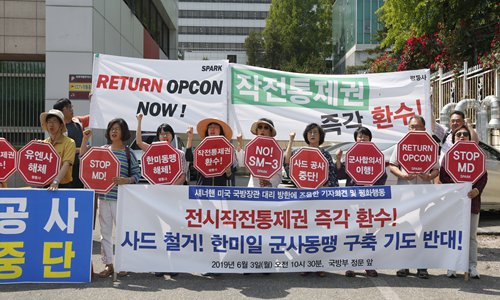HOME >> OPINION
Deployment of missiles in Asia will do little to augment US power
Source:Global Times Published: 2019/8/5 19:28:40

South Korean protesters gather to protest against the Operational Control (OPCON) and the Terminal High Altitude Area Defense (THAAD) on June 3 as former US Defense Secretary Patrick Shanahan arrived in Seoul on June 2 for a two-day visit. Photo: IC
Editor's Note:
US Secretary of Defense Mark Esper said on Saturday that he wants to deploy ground-based intermediate-range conventional missiles in Asia, just one day after his country formally withdrew from the Intermediate-Range Nuclear Forces (INF) Treaty. How will the decision influence Asia's security landscape? What are the challenges the US faces in this regard? The Global Times talked to two Chinese experts on these issues.
Li Haidong, professor at Institute of International Relations, China Foreign Affairs University
US deploying intermediate-range missiles in Asia will escalate tensions with China and Russia, increase divergences with its regional allies and accelerate the US decline.
It will undermine the balance of strategic relations among great powers and impair regional stability. It reflects the US pursuit of absolute security of itself and takes no account of other countries' security.
China's influence in Asia is rising, while US popularity in the region is waning. The decision to deploy missiles is also a manifestation of US discontent with the status quo.
There is little doubt that the US will deploy intermediate-range missiles after withdrawing from the INF. The question is when and where to deploy them. It would be difficult to predict the exact time because it depends on US own agenda.
In terms of the location, it is likely to be in US territories in the Asia-Pacific region, such as Guam and Wake Island.
Territories of its allies in this region would be another potential option. As the deployment of missiles is directed against China and Russia, South Korea and Japan will likely be chosen as the locations.
The probability of deploying missiles on Japanese soil would be higher. Although China and Russia would pile pressure on Japan, when it comes to security, Tokyo has always been a puppet of the Washington.
Seoul, on the other hand, will likely not cooperate with Washington in this regard. South Korea's possible resistance may mainly come from its concerns about the impact on its economy, because it is more closely linked to China economically than to the US or Japan. South Korea also has lessons to learn from the deployment of US Terminal High Altitude Area Defense in 2017. The move irked Beijing, which led to China slapping sanctions on South Korean companies.
If the US deploys intermediate-range missiles in Asia, China will certainly carry out countermeasures and augment its own missile forces in response, so as to effectively deter the US. Furthermore, it will lead to closer ties and strategic coordination between Beijing and Moscow.
Washington should devote more resources into its domestic affairs. Crises are emerging over issues such as US national security and ethnic identity. Political infighting and mass shootings are becoming increasingly frequent. US attempt to divert resources and energy to overseas issues will not solve its own problems at home, but will only exacerbate US decline.
Zhang Jiadong, professor at the Center for American Studies, Fudan University
US plan of deployment of intermediate-range missiles in Asia would have a significant effect on geopolitics and security in the Asia-Pacific region, because US military has always been the most powerful force in the region.
However, the US could deploy the ground-based intermediate-range missiles only in its territories such as Guam, rather than in Asia.
South Korea and Japan won't side with the US on the deployment of these missiles on their territories because it would make their own territories the top target for attacks during war.
Both Asian countries would also worry that the deployment of missiles would impair their relations with neighboring countries. A big part of North Korea nuclear negotiations are about missiles. If South Korea and Japan approve the deployment, they will no longer be in the position to object missile programs of North Korea or other countries.
Newspaper headline: US missiles in Asia will hurt stability
Posted in: VIEWPOINT